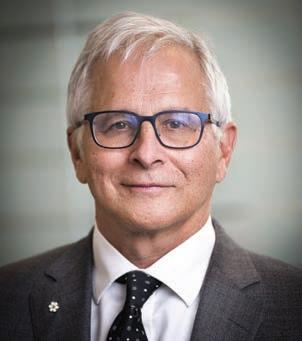
3 minute read
Elder RITA CORBIERE
By Laura Sharp, Nahwegahbow Corbiere
Rita Corbiere was born on February 21, 1935. She is a proud mother and grandmother to 7, of whom 4 are actively involved in sport and community. She is also known to her great grandchildren as Gchi Mama. Her spirit name, which she received at a very young age, is Ginii Kwe (Wild Rose).
Advertisement
Elder Corbiere is Ojibway/Odawa from Wikwemikoong Unceded Indian Reserve. She is a status Indian and is not a Robinson Huron Treaty annuitant. Elder Rita Corbiere was raised in a loving and hardworking home by her mother Sarah Ominika in their log house. The original family name is Ominikamigo. Her family consisted of one brother, 3 sisters and one adopted sister. Three more relatives joined to become a part of their family bringing the number to 8. Their door was also open to other relatives that came and went depending on their circumstance—homelessness, lack of food, seeking work, etc. Their little family worked hard to support themselves with gardening, harvesting, crafts, collecting water, etc. No one was exempt from the work, even the smallest had something to contribute. She married her husband Eric Corbiere in June 1958 and they had a daughter, Maxine Sara, married to Gerard Peltier. They also helped to raise a foster daughter Winnie and her niece Muriel. Elder Rita Corbiere and her husband Eric were fortunate to celebrate their 50th wedding anniversary in 2008. Eric passed away on July 2, 2014.
According to Elder Corbiere, amongst Anishinaabe people, knowledge is passed on in a number of ways through the Anishinaabe language, through teachings from Elders, including parents, grandparents, aunts and uncles, as well as through ceremonies and Aandsokaanan. These are stories or legends from the past—they could be about how animals lived or about Nanabozho—and they provide lessons to live by for Mna Maadziwin, living a good life. This is still happening today but there is also formal education in schools. Only the Anishnaabe language was spoken in Elder Corbiere’s home. Smudging took place, tobacco, sage, fire and water were used.
“Traditional values were a part of their Anishnaabe language and were taught every day.” Referring to what are now called the Seven Grandfather Teachings, Elder Corbiere says, “these were lived.” The Seven Teachings are: Mnaadendimowin (Respect), Zaagidwin (Love), Dbaadendiziwin (Humility), Debwewin (Truth), Gwekwaadziwin (Honesty), Nbwaakaawin (Wisdom) and Aakwa’ode’ewin (Courage). Visits from outside doctors were rare. Elder Corbiere had a great aunt, Mary Mandamin, who was a medicine woman. She looked after the family through many illnesses with traditional medicines. Elder Corbiere’s main Anishinaabe teachers were her mother Sarah Jacko and her Great Aunt Mary Mandamin. Growing up, Elder Corbiere learned to celebrate her culture through ceremonies and continues to do so today. These healing ceremonies include Pipe, Full Moon, Rain Dance, Sweat Lodges and the Shaking Tent.
Residential School, Further Education and Employment
Elder Corbiere attended elementary school in Wikwemikoong and then left home for Spanish Residential School in September 1949. She lived there for 5 years, coming home for Thanksgiving, Christmas, Easter and summers. When she started there, she only spoke Anishinaabemowin. She learned to speak the English language while at this school and graduated from Grade 12 in 1954. Elder Corbiere was employed in Wikwemikoong for many years as an elementary school teacher (1954-1988). She also served the community as a vice principal (1986-1988), acting principal (19891990) and then principal (1990-1996). During many of those working years she also worked to further her education. Once she completed high school at Spanish Residential School, she went on to complete the Ontario Teachers Certificate Program (1968) then attended Laurentian University where
she received her B.A. in Native Studies and Environmental Studies (1980). She continued her part time studies and further completed her Bachelor of Education (1983), Special Education Specialist (1983), Primary Education Specialist (1990) and finally the Principal Qualification Program, Nipissing University (1992). Elder Corbiere retired in 1996.






